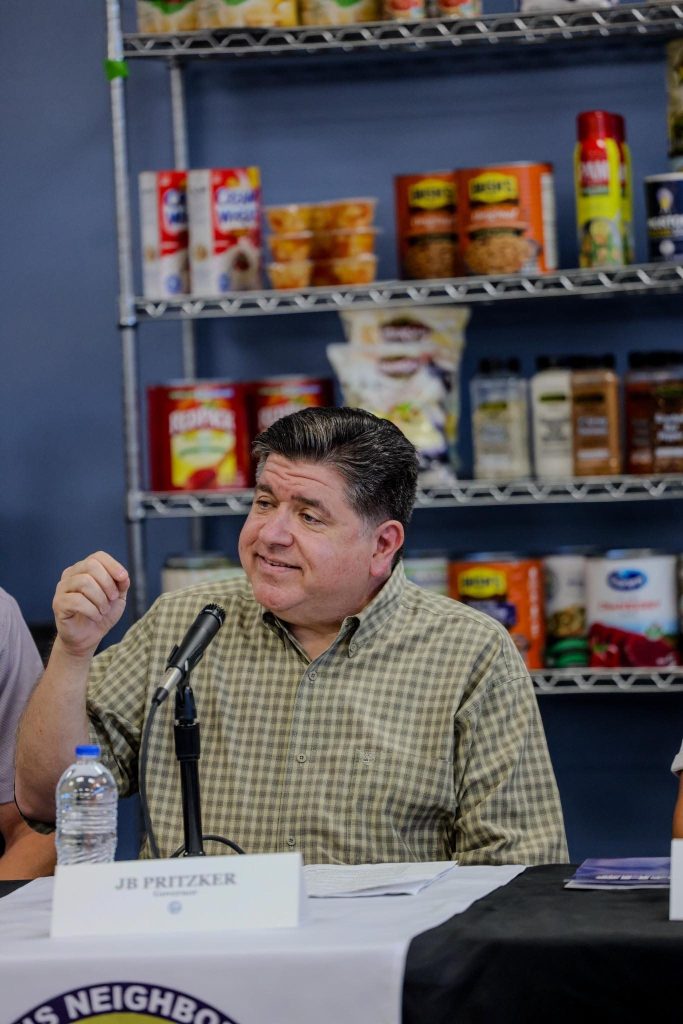
By GREG BISHOP
Illinois Radio Network
EAST SAINT LOUIS, Ill. (IRN) — Illinois’ governor says Congressional Republicans and President Donald Trump are cutting food benefits for those who need it most to give tax cuts to the most wealthy. A Republican state senator said accountability requirements are not controversial.
Visiting East St. Louis Tuesday, an area of the state where one in five people utilize SNAP, Gov. J.B. Pritzker said things like work requirements and other eligibility checks Trump enacted are too burdensome for those that need it most.
“Let’s assume they’re not cruel, you know what they’re trying to do? They’re trying to take money away from this program and truly, not trying, they just did it, and give huge tax cuts to the wealthiest people of this country,” Pritzker said, referring to an extension of the Tax Cuts and Jobs Act that benefits most taxpayers.
The “One Big Beautiful Bill” passed by Congress and signed by Trump on July 4 requires able-bodied adults without dependents to fulfill work-related requirements to receive the benefits. It also cracks down on states with high SNAP payment error rates and hikes states’ share of the program’s administrative cost by 2027.
Pritzker said SNAP provides more than $7 billion in economic activity for Illinois every year and extra checks on eligibility Trump implemented are too burdensome.
“And the more burden we put on the poorest people in our state, the harder it is for us to deliver for them because the federal government has put up these barriers,” he said.
A statement from the governor’s office said over 1.9 million Illinois residents use taxpayer-funded SNAP benefits and estimates 360,000 of them could be at risk because of the new eligibility requirements.
The panel discussion included Pritzker administration officials, local food bank operators and the Illinois Retail Merchants Association.
In reaction, Republican state Sen. Andrew Chesney, R-Freeport, said Pritzker is a billionaire politician who’s too busy playing politics to care about accountability.
“If you want grandma and grandpa and Aunt Ethel to pay for your food stamps and you have the ability as a 25-year-old to work, get off your butt and work,” Chesney told The Center Square. “I don’t think that’s controversial.”
A Pritzker administration official said the changes could cost state taxpayers up to $800 million a year.
“As part of the bill, for the first time in the program’s 60-year history, the federal government will require the majority of states to fund a portion of SNAP benefits, potentially costing Illinois more than $700 million,” a statement from the administration said. “Implementing and administering these changes is projected to cost Illinois an additional $100 million.”
Chesney suggested how to cover the extra costs to state taxpayers.
“We could stop funding illegal immigrants, that’d be a good place to start,” Chesney said.
Illinois spends hundreds of millions in state taxpayer money on non-citizens for health care and other subsidies each year.
“We could always look at waste, fraud and abuse,” Chesney said.
According to the U.S. Department of Agriculture, Illinois’ SNAP payment error rate for the previous fiscal year was 11.56. The error rate includes overpayments and under payments. Illinois’ overpayment rate was 10.64, higher than the national average of 9.26.
“The federal government is correctly telling the state of Illinois, you know, clean up your SNAP program, be more accountable, hold your people accountable, hold your residents accountable,” Chesney said. “And Gov. Pritzker, you know, has the gall to tell people that this is a tax cut for the rich.”
Meanwhile, Illinois Attorney General Kwame Raoul’s office announced Tuesday Illinois is joining a coalition of 22 other states and attorneys general challenging the USDA’s demand that states turn over personal information about SNAP recipients.





